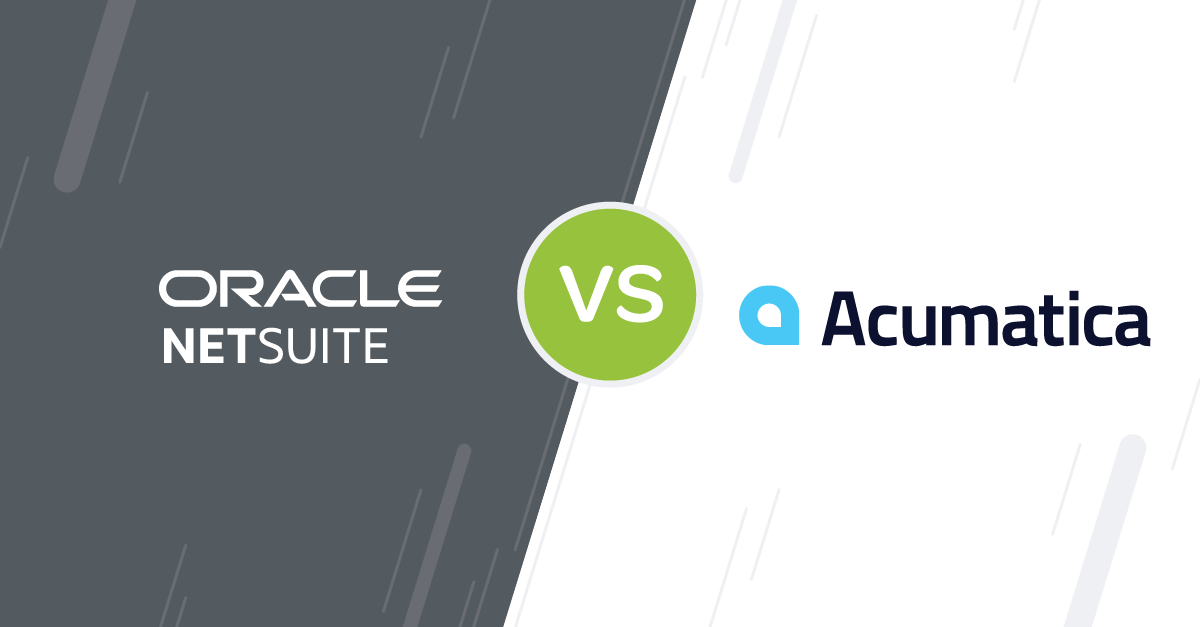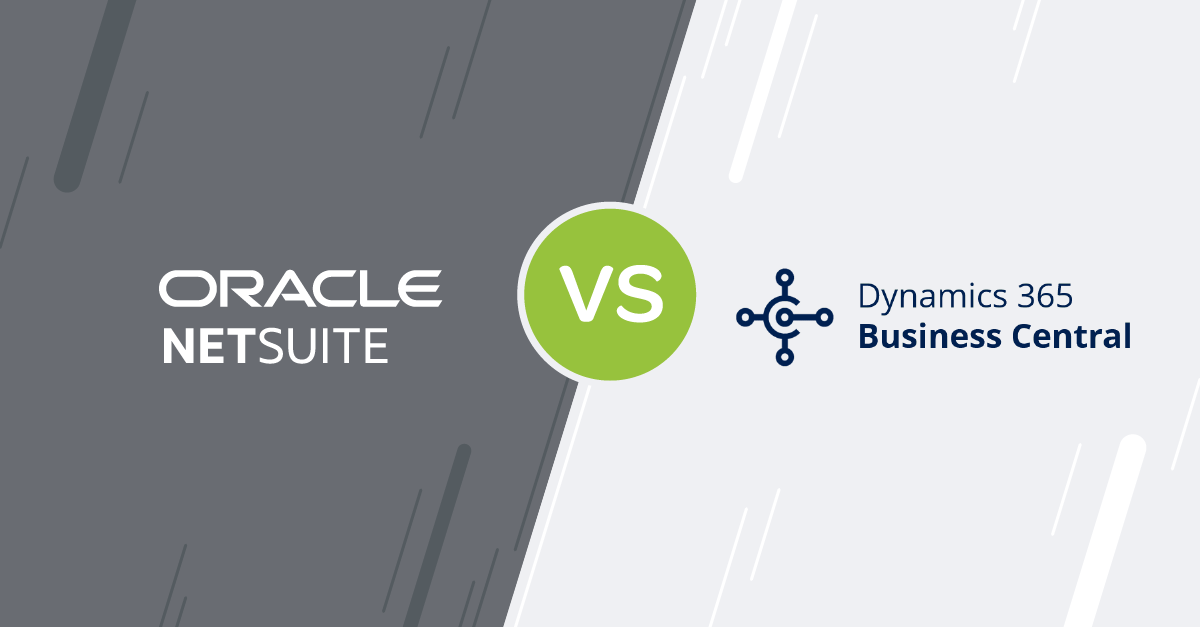Blog
Share this
Acumatica vs. Netsuite: Which Cloud ERP is Best?

by Jalene Ippolito on March 03, 2022
Finding a new ERP solution is an important choice for growing businesses – but it can also be overwhelming. There are so many options to choose from, how do you know which one is right for you? This is a great place to start. We’ll look at two of the leading cloud ERP solutions for small to mid-size companies – Acumatica and NetSuite. Like anything, there are pros, cons and things to consider. We’ll take you through all of it to help you decide which solution is best for your business.
What is Acumatica?
Founded in 2003, Acumatica has quickly grown a customer base of over 8,000. They offer an ERP solution that’s built for the cloud, but can be deployed on-premise where required. The modular design lends itself well to functional groupings based on industry needs, with editions for a variety of industries, including distribution, manufacturing, professional services and construction.
What is NetSuite?
NetSuite is a pioneer in cloud ERP for growing businesses. First launched in 1998, the company was acquired by Oracle in 2016, making Oracle the biggest software services provider in the world. Today, NetSuite has customers across 100+ countries, ranging in size from start-up to enterprise.
So, how do Acumatica and NetSuite two stack up against one another? Let’s find out.
Deployment options & licensing
Acumatica is built as a public cloud solution, but can also be deployed on-premise or in a private cloud environment. This offers added flexibility and can be a definite plus if you have industry regulations that require an on-premise solution for security purposes. Keep in mind that an on-premise ERP deployment has the added risk and cost of buying and maintaining hardware, plus the IT resources to manage it all.
The Acumatica deployment model you choose will also impact whether you have subscription or perpetual licensing. As the customer, you have a choice in how your system is deployed. But keep in mind that it also adds a level of complexity for Acumatica, as they have to support and maintain three versions of the same product. It’s worth asking the Acumatica partner you’re talking to how this is managed.
NetSuite is a public cloud solution – there’s no option for private cloud or on-premise. As a customer, you don’t have to worry about the IT overhead – backups, security protocols, server maintenance and the like are all handled for you. And you’re always on the latest version, giving you access to new features and bug fixes without the hassle of a complex upgrade. If you have strict data security requirements to meet, it may or may not be possible with NetSuite, even if the functionality meets your needs.
Have NetSuite questions? We've got answers.
We’re here to help you choose what’s right for your business. Book a quick call with our team to clarify your ERP options and take the next step with confidence.
Industry-specific functionality
One of Acumatica’s greatest strengths is their focus on industry-specific editions. They list five focus industries on their website, but they’re particularly strong in Construction and Field Service (industries where NetSuite doesn’t play well). Acumatica also has strong manufacturing functionality, including a product configurator, catch weights, recipe management and formulation, and food safety.
Here are the industries where Acumatica fits:
- Construction
- Wholesale Distribution
- Manufacturing
- Retail Commerce
- Field Service
Like Acumatica, NetSuite has industry-specific solutions that are built out around a SuiteSuccess implementation model. It all starts with your industry and builds out from there with a bundle of ERP modules needed to meet your industry needs. This implementation approach is based on industry best practices to give you optimized processes, workflows, reports and dashboards. The result is a more predictable implementation cost and faster time to value, with the flexibility to add other functionality or tailor processes based on your needs.
You also have the option to choose a more traditional implementation model with NetSuite, where the system design is scoped specifically to your needs, regardless of what industry you're in.
Here are the industries where NetSuite fits:
- Wholesale Distribution
- Manufacturing
- Retail
- Professional Services
- IT Services
- Software & Technology
- Transportation & Logistics
- Non-profit
You can see that NetSuite supports a broader range of industries. And you might wonder how one solution could meet the needs of so many industries. The answer is simple – NetSuite is a larger organization with more resources to build out functionality. Acumatica has strong capabilities for their focus industries as well, their solutions just aren’t as adaptable to the functional requirements of different industries.
ERP solution cost
Acumatica has an attractive sticker price, with a transactional pricing model based on your transaction volume, not the number of users you have. For some companies, this approach makes sense, provided they get the depth of functionality they need. But it’s also important to consider what that cost looks like as you grow. As you add more users, your transaction volume will also increase, so your cost still increases over time, just in a different way. Fast-growing companies can be caught off-guard by significant price hikes as their transaction volumes increase. Depending on the speed of your growth, the cost could be a bit unpredictable. That’s not to say you won’t get good value for functionality from Acumatica – just do the math on what the cost looks like over time.
We’ll admit that NetSuite pricing can be complicated, as it considers the modules you buy, the size of your company, your user count and even the length of your subscription. That’s why you won’t find a generic NetSuite price anywhere online, but you can easily get a quote by connecting with a NetSuite partner. Keep in mind that NetSuite’s modular design allows you to build up your solution brick-by-brick, implementing functionality as you need it. This is a plus for companies that want to take a phased approach, rolling out new features over time to increase user adoption and control costs.
Depth of functionality
Aside from industry-specific functionality, user experience is Acumatica’s other greatest strength – it’s an easy-to-use solution that works great on browsers and mobile devices. The user interface is clean and modern, with reports and dashboards that can be customized to individual preferences.
Some report Acumatica’s inventory management and MRP capabilities to be on the simple side, requiring other add-on products to fill those gaps and reach what is considered standard functionality in other ERP solutions. Acumatica also uses batch processing, which reduces the accuracy and visibility in KPIs, reports and dashboards – essentially, you’re looking at a point-in-time view, not real-time. And if you need to perform intercompany transactions, you’ll be performing manual consolidation unless you implement an intercompany accounting middleware engine.
By comparison, NetSuite has strong native functionality for intercompany accounting and financial management. They also have their own Warehouse Management System (WMS), built on the NetSuite platform, rather than relying on third-party integrations. But if you need process manufacturing capability, you’ll need a third-party solution like Blend ERP.
Our advice is the same no matter which ERP software you’re evaluating – dig deep and ask lots of questions to understand exactly what the software is capable of. Then evaluate that against your requirements.
Which ERP software is right for you?
As you can see, Acumatica and NetSuite each have their advantages and disadvantages. There’s no one solution that’s right for everyone.
The right ERP solution will always depend on your requirements.
If you decide NetSuite is worth exploring, we can help. As a NetSuite implementation partner, we’re big believers in the NetSuite solution – when it’s the right fit for the right company.
Share this
Stay in the Know!
Join other SMEs who receive our monthly ERP insights, tips and best practices.
You may also like

ERP Funding for Canadian Businesses

Should You Work with a NetSuite Implementation Partner or Go Direct?



